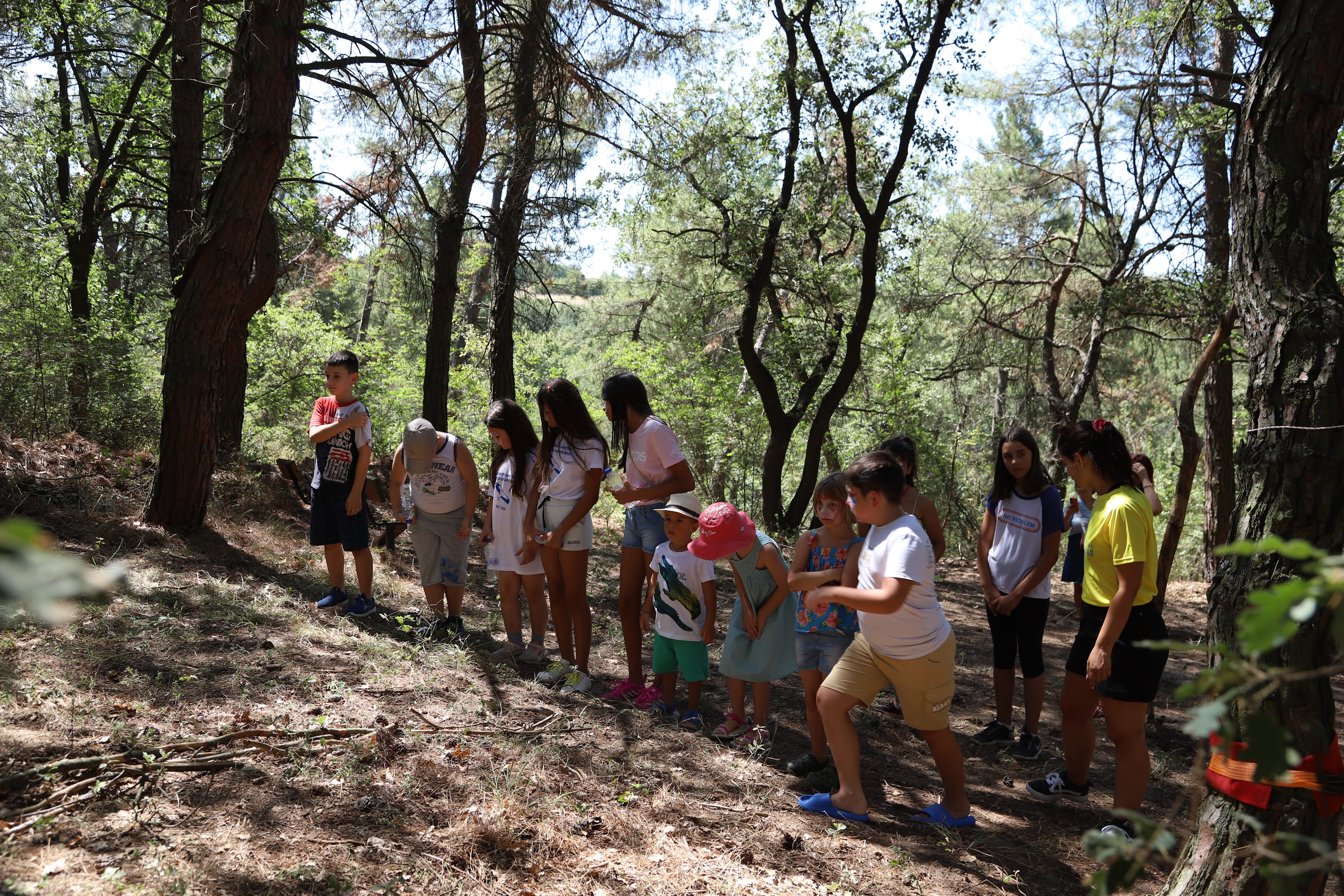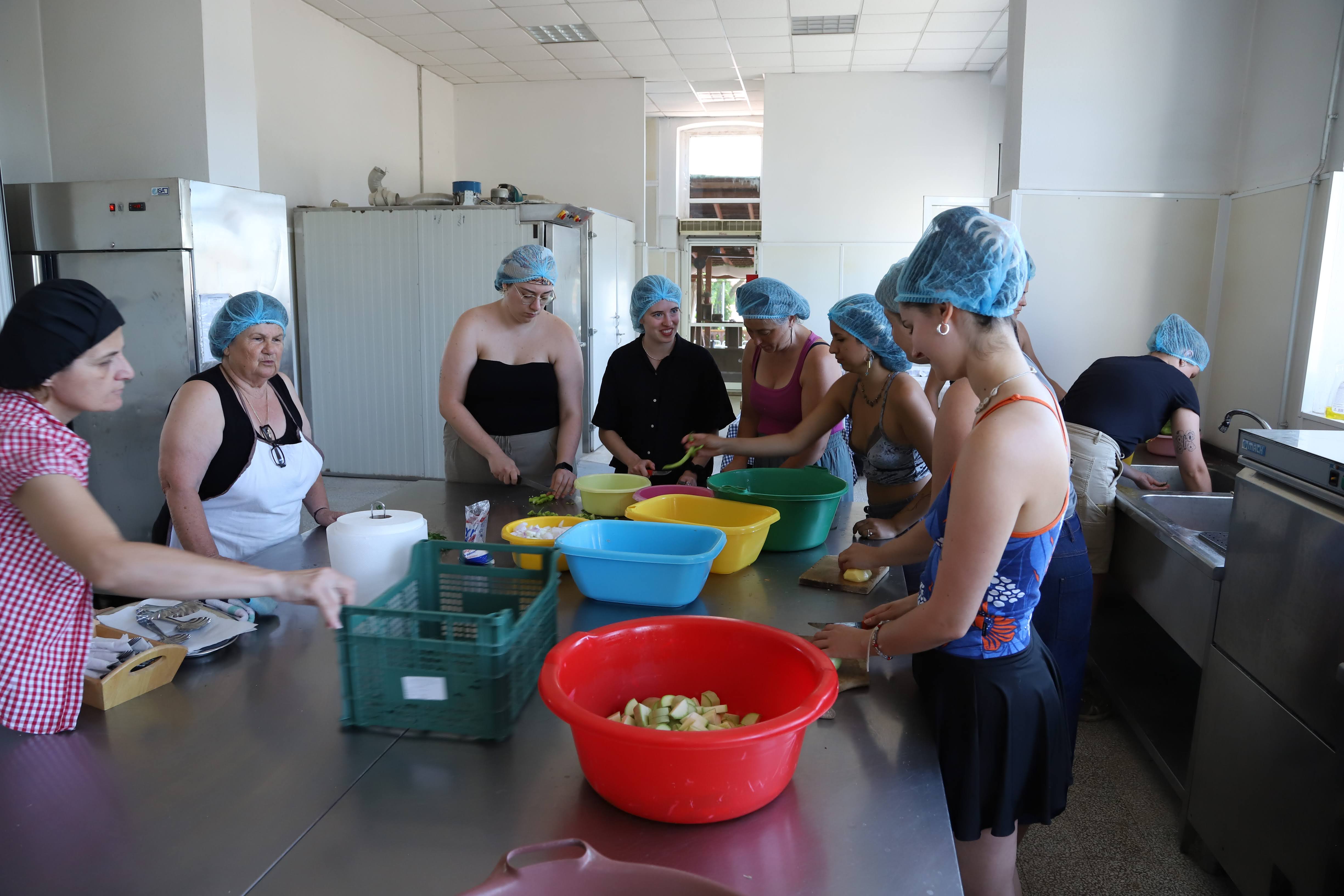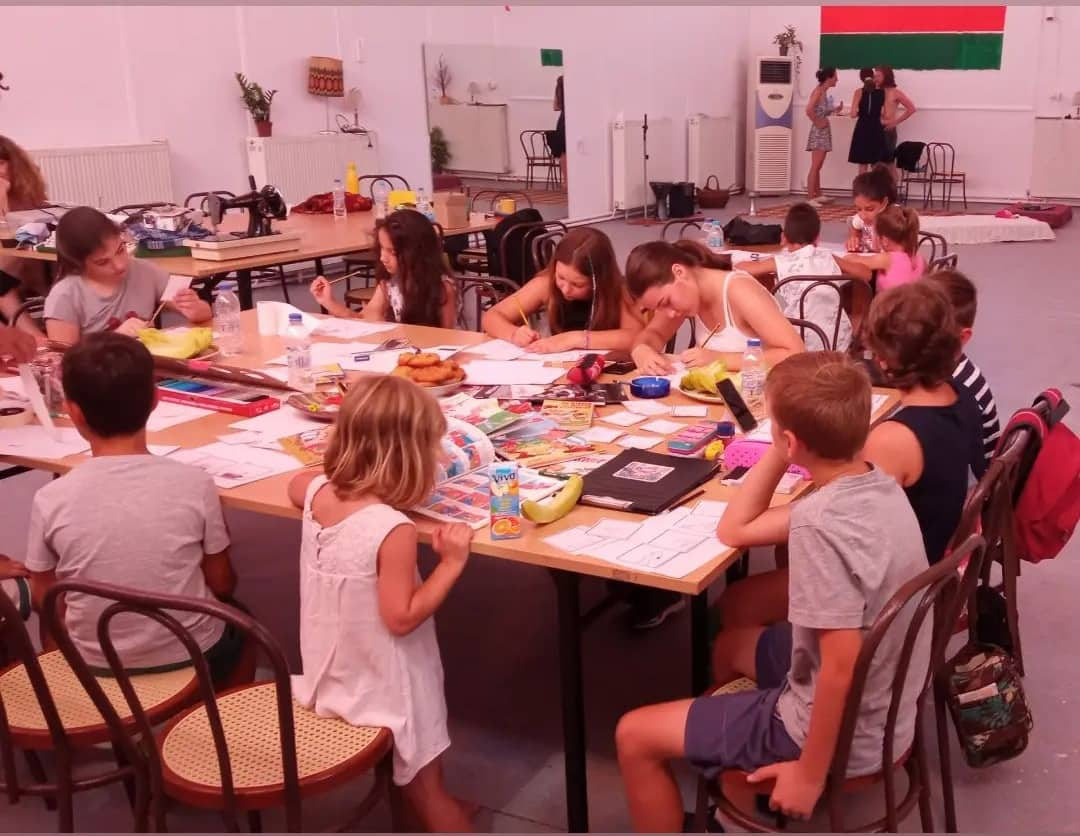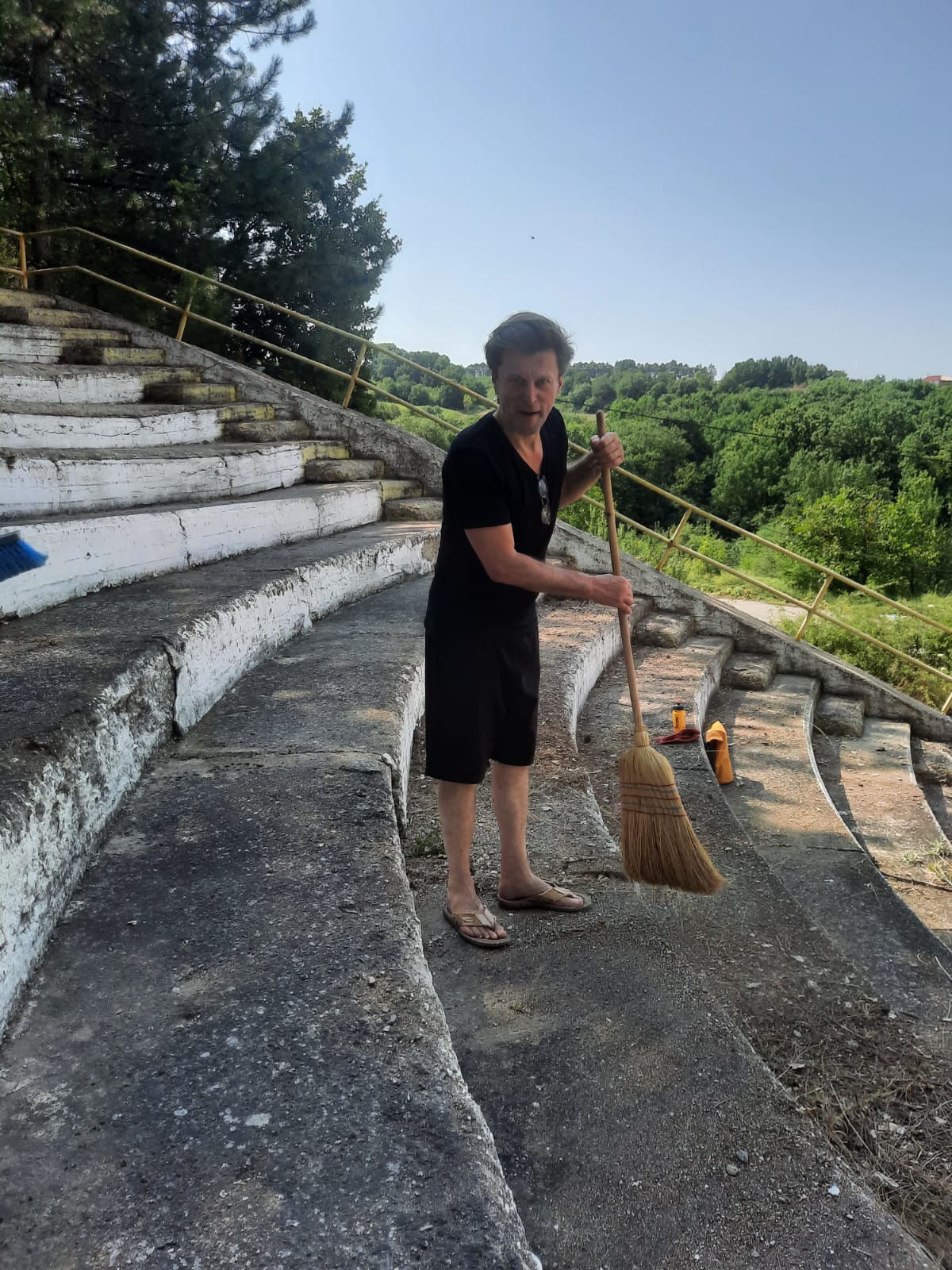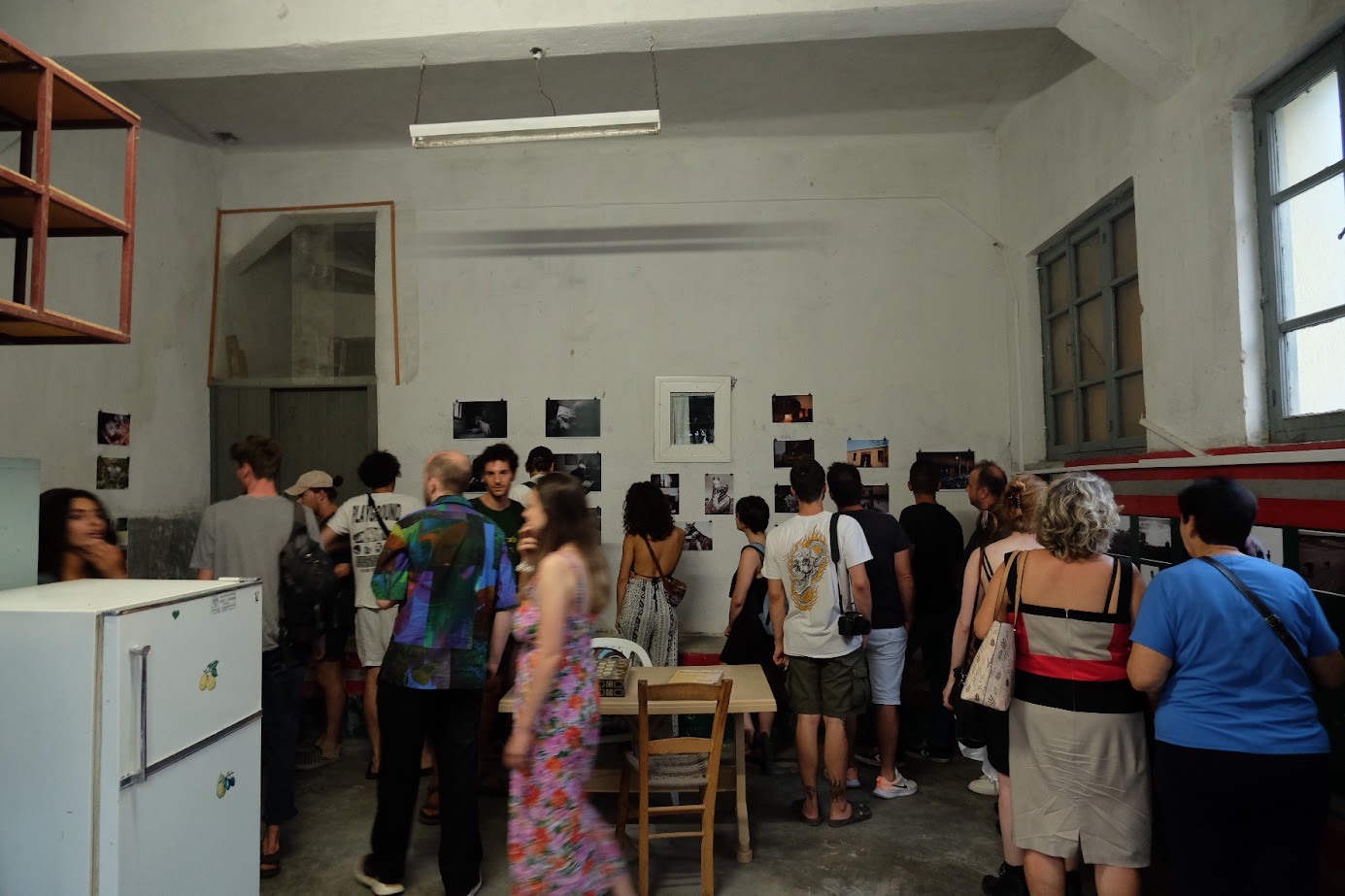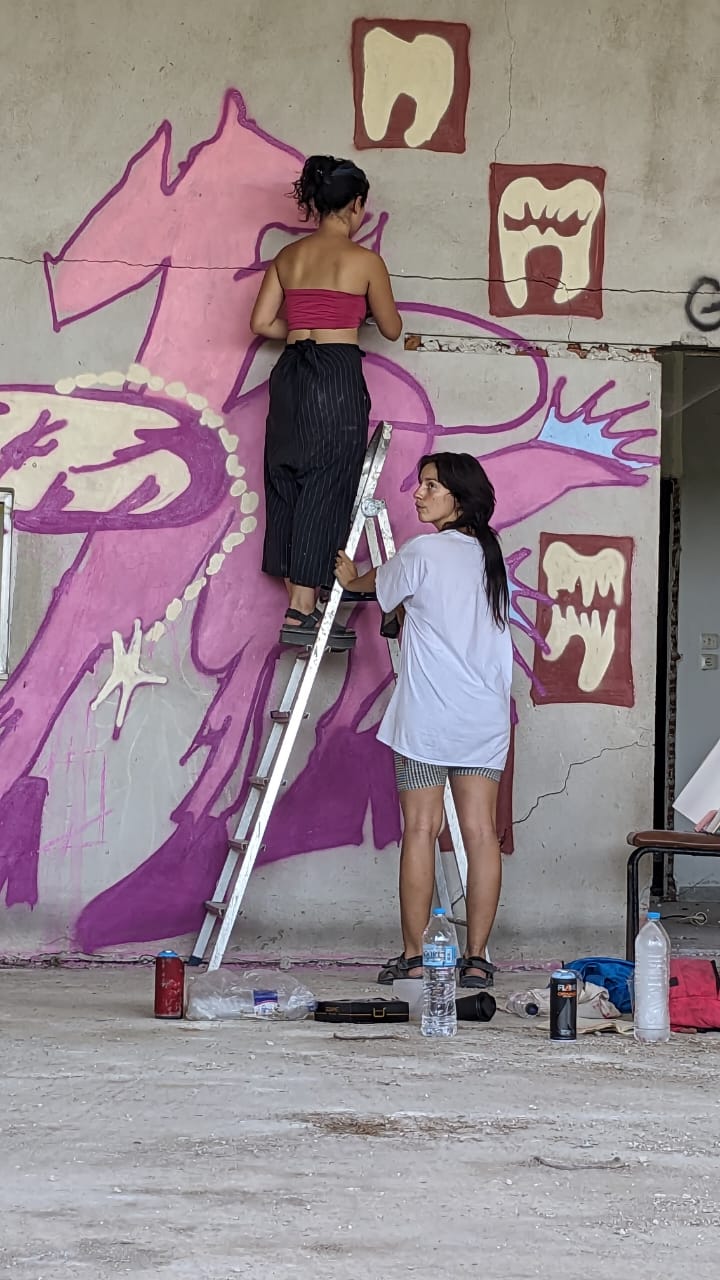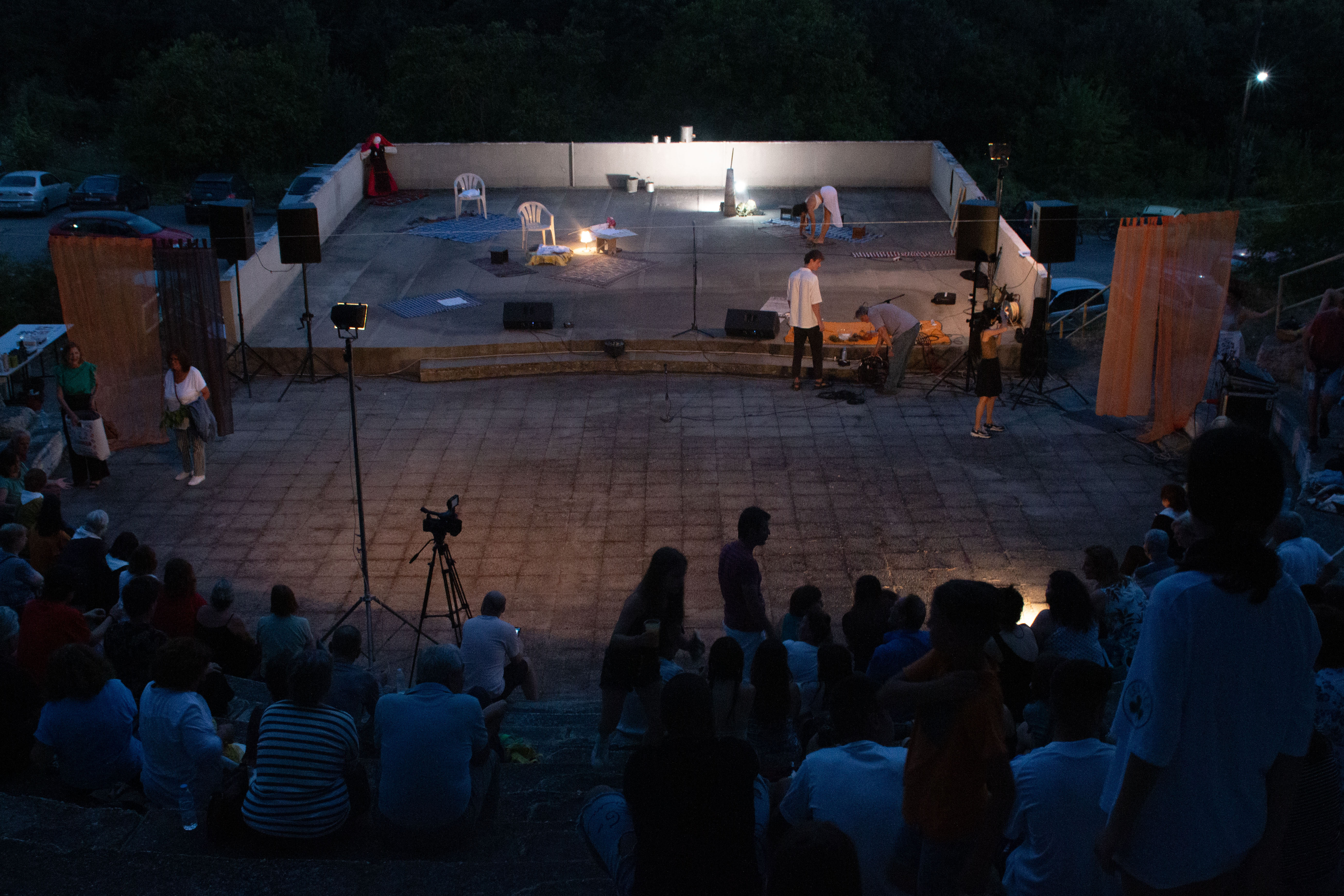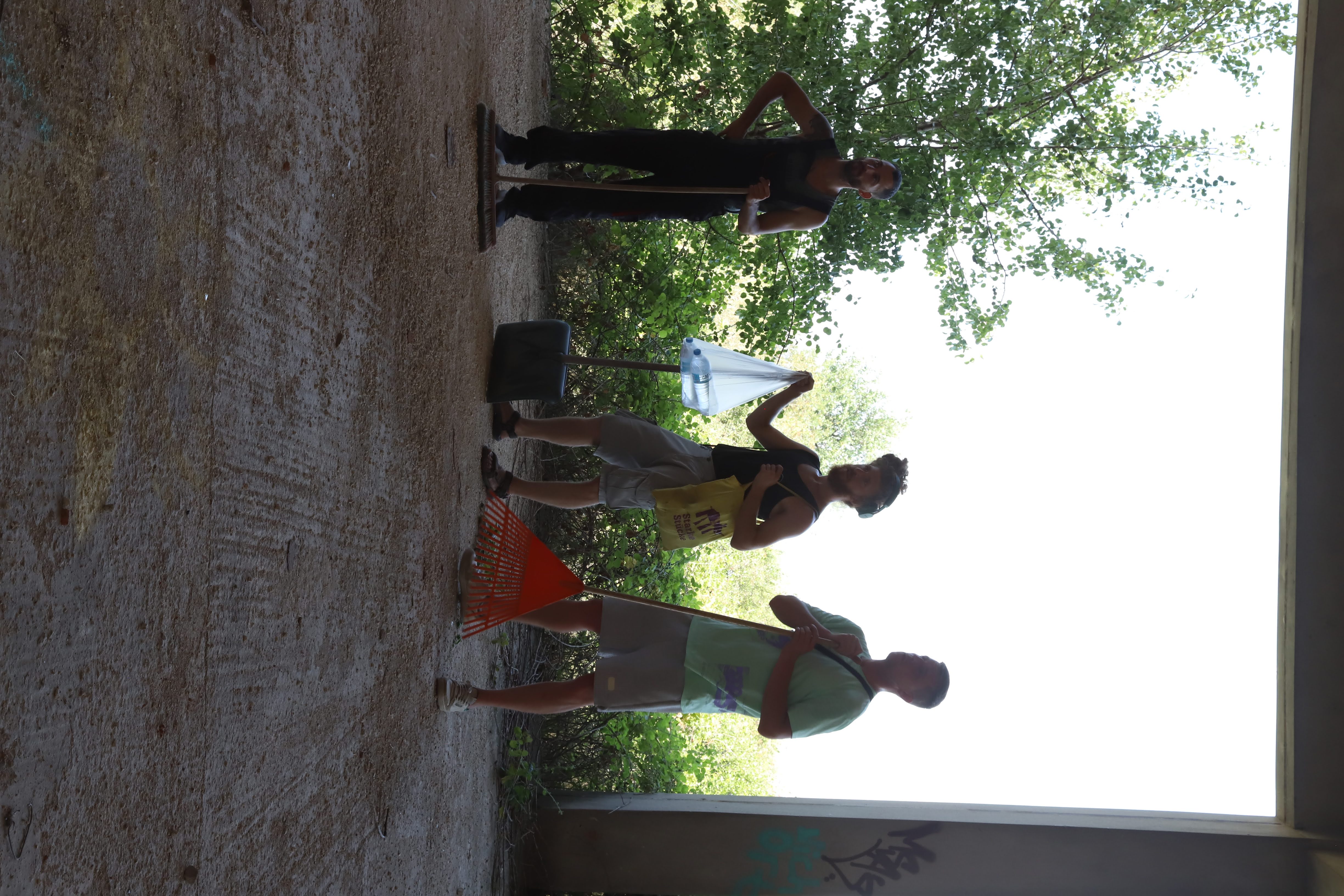Regaining a sense of belonging
Cotranspose: Reclaim Space
Cotranspose: Empowering Communities to Reclaim Spaces
Cotranspose facilitates community place-making by reclaiming inactive spaces. We connect diverse communities to create shared spaces, fostering a stronger sense of belonging and cultural revitalisation through collaborative innovation.
Greece
Local
The project is implemented in various locations within the Trigono region, including the villages of Dikaia, Palli, Dilofos, and Spilaio.
It addresses urban-rural linkages
It refers to a physical transformation of the built environment (hard investment)
Yes
2022-08-31
No
No
Yes
Yes
Yes
As a representative of an organisation
Cotranspose facilitates community place-making by reclaiming inactive spaces within the Trigono region, North Evros. We empower diverse communities to co-create shared spaces, fostering a strong sense of belonging and cultural revitalisation through collaborative innovation. Our aim is to transform depopulated rural areas, addressing both the lack of physical and conceptual space for diverse creative communities (space to think, exist freely, and belong) and the systemic decline of rural areas. Through a community-driven approach, we establish spaces of commoning, utilising abundant inactive rural spaces to offer both locals and international participants spaces that address diverse needs: affordable housing and workspaces for internationals, contributing to local revitalisation; freedom of creative expression, leading to cultural access for locals; and inspiration from local stories, resulting in the recording of intangible heritage. The creative exchange between locals and international participants creates a dynamic environment for innovation and cultural enrichment. Achieved outcomes include revitalised community spaces, increased cultural access, strengthened community bonds, the reclamation of local heritage, and the creation of spaces that facilitate human flourishing both mentally and physically. This approach allows for a unique form of bottom-up placemaking that adapts to the specific needs of the communities served.
Community
Placemaking
Revitalisation
Exchange
Co-creation
Cotranspose demonstrates sustainability through the strategic reuse of inactive rural spaces, minimising the need for new construction and reducing environmental impact. Our low-cost model, reliant on repurposing existing materials, ensures resource efficiency and financial accessibility. We promote sustainable rural living by encouraging long-term community relationships, fostering repeated participation, and supporting individuals to develop enduring connections with the region. This horizontal model of exchange, based on mutual respect rather than economic factors, creates a resilient and sustainable community network. We adopt a non-touristic approach, prioritising the well-being of local communities and the environment. Participants are encouraged to leave spaces in an improved state, ensuring a positive and lasting impact. Furthermore, Cotranspose facilitates knowledge exchange and production, including workshops and projects that explore and record local sustainable practices, and the integration of international knowledge on sustainable techniques for local application. This commitment to sustainable practices underscores Cotranspose's dedication to creating a responsible and enduring model for rural revitalisation.
Cotranspose prioritises an experiential approach to aesthetics. This is achieved through participatory methodologies, co-design, and the collective reclamation of inactive spaces. By respecting individual knowledge and practices, and especially by honouring local identity and aesthetics, we create spaces that resonate deeply with the community. These are not spaces created for communities, but with them, ensuring a sense of ownership and belonging. The reclamation process transforms spaces that were once stark reminders of local decline into vibrant cultural and social hubs, fostering a sense of collective achievement. The resulting environments are not merely visually appealing; they are immersive spaces where learning, creating, and connecting become deeply personal experiences. Each space is a testament to the community's agency, reflecting their collective vision and aesthetic preferences. This approach cultivates a sense of 'yours', fostering a sense of belonging within spaces that are collectively designed and resonate with the community's identity.
Cotranspose prioritises inclusivity through the radical sharing of privilege, fostering a space where basic needs are met, enabling creative exploration and community co-creation. We reject exclusionary practices, such as open calls and CV-based selection, recognising that these perpetuate existing inequalities. Instead, we prioritise personal connection, engaging in meaningful conversations to build authentic relationships. This approach creates a radically accepting environment, free from hierarchies, control, and competition, where individuals are celebrated for their unique contributions. Cotranspose ensures diverse voices are represented by maintaining a diverse team. All programmes are offered free of charge, guaranteeing accessibility for all. We directly address the lack of cultural and social activities in underserved rural areas by providing accessible programmes. To better understand and meet participants' needs, we implement methodologies such as accessibility forms. We further enhance accessibility through educational workshops and knowledge exchange initiatives. Participants are empowered to contribute to projects based on their pre-existing skills and interests, rather than being confined to imposed labels or roles. Our commitment to accessibility extends to providing a hospitable space in a rural setting, offering housing, abundant space, food, and community to those who seek it. We acknowledge the challenges of this location, including transportation and geopolitical tensions, and ensure that participants are fully informed. By focusing on personal connection and resource availability, rather than selection, we create a truly inclusive community where everyone feels valued and empowered.
Cotranspose operates on the principle that democratic participation is fundamental to community empowerment. This philosophy is evident in our deep commitment to involving local citizens in every stage of our projects. Cotranspose addresses the profound sense of disconnection and lack of opportunity experienced by residents in the Trigono region. Prior to our intervention, access to cultural and social programmes, particularly at a translocal level, was severely limited. This scarcity contributed to a pervasive feeling of disenfranchisement, notably among local youth, where interviews revealed a unanimous desire to leave the area. To counteract this, Cotranspose implements participatory processes, empowering residents to co-design both programmes and spaces. This approach fosters a tangible sense of ownership and pride, directly challenging the prevailing feeling of not belonging. Youth are actively engaged, not only gaining valuable experiences through interactions with international participants, but also contributing to the very fabric of their community. Local residents are further involved through artistic contributions, sharing their skills, narratives, and knowledge, thus strengthening community bonds and reclaiming their cultural voice. By instilling a sense of ownership, community, and active democratic involvement, Cotranspose combats the challenges of governmental neglect, poverty, and limited resources. We aim to create a sustainable environment where residents are empowered to shape their own surroundings and rediscover their sense of belonging, transforming their perception of home.
Cotranspose strategically cultivates multilevel stakeholder engagement, crucial for fostering belonging and rural revitalisation. At the local level, we build strong community partnerships. Founders and team, embedded locally, act as liaisons, ensuring understanding of residents' needs. Programmes are co-designed with locals, empowering them to shape outcomes. We engage local schools, initiatives like GAIA, and community groups, integrating their expertise. Partnerships with local businesses expand resources. Our hub, Steki, co-designed with residents, addresses identified needs. At the regional level, we maintain strategic relationships with the municipality, leveraging administrative support. Nationally, we secure funding from the Ministry of Culture for our festival. European engagement is pivotal, including TEH and New European Bauhaus networks, and collaborations with international initiatives. Creatives from around the world bring diverse insights through residencies, fostering translocal exchange. This multilevel engagement is foundational to creating inclusive, sustainable, and innovative community spaces where diverse voices contribute to a shared vision of belonging.
Cotranspose operates at the intersection of diverse disciplines and knowledge fields, predicated on the principle that creative innovation emerges from the confluence of varied expertise. Our team, a collective of individuals with backgrounds in arts, dance, architecture, communication, social engagement, education, and local knowledge, embodies this interdisciplinary ethos, ensuring a nuanced and multifaceted approach to our projects. We engage creatives from fields encompassing arts, dance, theatre, architecture, engineering, social sciences, and education, facilitating their contributions to both spatial revitalisation and community-based research through the application of their specialised knowledge. Within the local community, we strategically integrate individuals and initiatives possessing practical, hands-on craft skills, alongside local knowledge holders of sustainable techniques, and collaborate with educational institutions to ensure a holistic approach. Our horizontal approach, characterised by equitable knowledge exchange, empowers all participants to contribute authentically, fostering collaborative creation of innovative and inclusive spaces. The transformed spaces, serving as creative hubs, research platforms, and community participation venues, exemplify this interdisciplinary integration, simultaneously embodying sustainability and accessibility principles. This deliberate synthesis of diverse disciplines and knowledge fields ensures that Cotranspose's projects are not merely aesthetically compelling but are fundamentally rooted in community needs and sustainable practices, reflecting a comprehensive and integrated approach to rural revitalisation.
Cotranspose distinguishes itself from mainstream practices through a fundamentally community-centric and radically inclusive approach. Our team, comprised of local residents and creatives, embodies the communities we serve, ensuring an authentic understanding of their needs and challenges. This project emerges not from abstract ideation, but from lived experience and a profound dissatisfaction with prevailing models of community development. We dismantle barriers, fostering a radically accepting environment where individuals are valued for their intrinsic contributions, regardless of the spectrum of skills, from academic to practical expertise. Cotranspose cultivates a space of physical and conceptual co-existence, grounded in mutual respect, anti-competitiveness, and an understanding of inherent individual worth. This paradigm shift directly challenges the competitive, production-driven models prevalent in mainstream initiatives, which often prioritise consumerism and end results over community well-being and genuine connection. Moreover, Cotranspose champions translocal exchange, reclaiming inactive spaces as cultural hubs, and fostering horizontal knowledge exchange, thereby redefining the very essence of rural development. This holistic integration of radical inclusivity, community ownership, and translocal collaboration sets Cotranspose apart, establishing a new standard for sustainable and equitable community transformation.
Cotranspose employs a synergistic methodology, intertwining participatory design and co-creation to foster community revitalisation. Residents are actively engaged in shaping both spaces and programmes, ensuring their needs and aspirations are central. Horizontal knowledge exchange, facilitated through workshops and collaborative projects, promotes equitable sharing of skills and expertise between local and international participants, creating a dynamic learning environment. Translocal exchange is integral, fostering intercultural dialogue and bridging geographical and cultural divides. Inactive spaces are reclaimed, transformed into vibrant cultural hubs that serve as catalysts for community engagement, demonstrating the transformative power of repurposing. Community-driven research informs initiatives, ensuring responsiveness to local needs and creating a feedback loop for continuous improvement. Flexibility and adaptability characterise the project, allowing it to evolve alongside the community, responding to emergent needs. Documentation and storytelling capture and share impact, amplifying reach and creating a narrative of change. An accessibility methodology ensures inclusive participation. Furthermore, diverse methodologies from the arts, architecture, social sciences, and education are integrated, unified by inclusivity and participation. This interdisciplinary approach creates culturally relevant and socially impactful solutions, reflecting a holistic and integrated methodology.
Cotranspose demonstrates a high potential for transferability and replicability across diverse communities and contexts. The project's fundamental principle lies in fostering mutually supportive connections between communities, achieved by identifying and matching complementary needs and strengths. This approach transcends geographical boundaries, addressing universal challenges such as depopulation, limited cultural access, and the need for creative expression. The core methodology, predicated on participation and accessibility, necessitates skilled facilitators capable of understanding and mediating community needs. This framework is adaptable to any context where communities seek to address shared challenges and leverage collective strengths. The global prevalence of these challenges underscores the project's broad applicability. Cotranspose's success serves as a practical demonstration of this model's efficacy, proving that community-driven, translocal collaboration can be a powerful catalyst for positive change. The project's replicability extends beyond specific activities or outcomes; it lies in the adaptable framework that prioritises community ownership and empowers residents to shape their own environments, making it relevant to a wide range of global challenges.
Cotranspose addresses global challenges by implementing localised, community-driven solutions that resonate on a larger scale. The project recognises that localised interventions can serve as microcosms for addressing systemic global issues. Rural depopulation, a widespread concern, is countered by revitalising abandoned spaces into vibrant cultural hubs, fostering a renewed sense of belonging and creating opportunities for residents. Simultaneously, the project combats limited cultural access in underserved areas by providing free, accessible programmes and workshops, democratising cultural participation. Social isolation and fragmentation are mitigated through the creation of spaces for intergenerational and intercultural exchange, rebuilding trust and fostering community cohesion. Local knowledge and heritage, often overlooked, are preserved and celebrated through the integration of traditional crafts and narratives into project activities, ensuring cultural continuity. The lack of creative spaces, a barrier to individual and community development, is addressed by offering accessible platforms for artistic expression and knowledge sharing. Sustainable development principles are embedded in the project through the reclamation and repurposing of existing structures, minimising environmental impact and promoting circular economy practices. Critically, Cotranspose challenges global inequalities by radically sharing privilege and fostering a culture of mutual respect and understanding. By addressing these challenges at the local level, Cotranspose demonstrates that community-driven initiatives can serve as powerful models for broader social and environmental transformation, reflecting the interconnectedness of micro and macro scales.
Cotranspose successfully implemented its methodology in July 2022, marking the project's completion. The pilot phase involved 22 international creatives, reclaimed 5 residential and 1 communal space, activated 10 community spaces for a co-created 3-day festival, engaged 1500 local participants, and delivered 10 community workshops. This pilot validated the project's efficacy in fostering community engagement and spatial transformation. Following this, Cotranspose has continued the re-implementation of the same project model, expanding its reach and impact. To date, approximately 200 participants, representing diverse fields and including university students, have contributed. Four additional spaces have been reclaimed as community hubs, 50 local spaces have been activated through events and exhibitions, and over 100 workshops have been conducted. Three festivals have been organised, engaging a large number of local participants. These activities have directly benefited local residents by providing access to cultural programmes, fostering a sense of belonging, and creating opportunities for skill development. International participants have gained valuable cross-cultural experiences and contributed to community revitalisation. The project has also indirectly benefited the wider community by enhancing cultural capital and promoting sustainable rural development. The reclamation of inactive spaces has resulted in aesthetically pleasing and functional public hubs, enhancing the overall quality of the built environment. Furthermore, the 'Co-llection' project, within Cotranspose, received the New European Bauhaus Award, recognising its innovative approach and impact. This award highlights the ideal conditions fostered by Cotranspose for projects that promote sustainability, inclusivity, and aesthetic quality. Cotranspose also received the Philippe Grombe Award from TEH for grassroots initiatives, further validating its impact.

